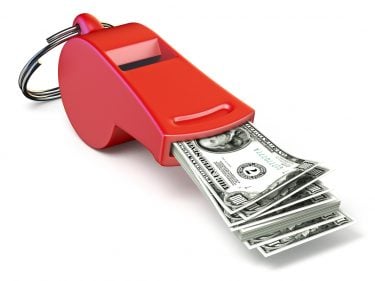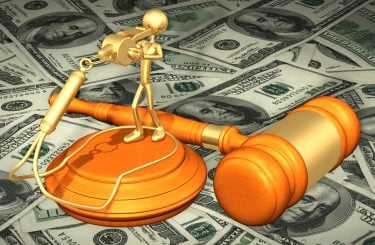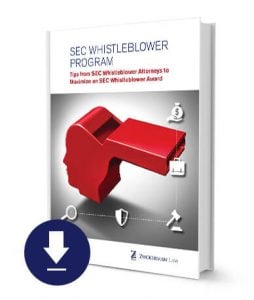SEC’s Increased Focus on Insider Trading
On March 23, 2017, a New York federal judge granted a temporary asset freeze against the assets of a Hong Kong private equity investor, Shaohua “Michael” Yin, who the SEC accused of making $29 million by trading on insider information about Comcast’s purchase of DreamWorks Animation.
According to the SEC’s complaint, filed on February 10, 2017, Yin used brokerage accounts under other people’s names to buy $56 million of DreamWorks stock (2.15 million shares) at a weighted average price of $26.25 per share. Shortly thereafter, Comcast and DreamWorks jointly announced that Comcast would acquire DreamWorks at a price of $41 per share. Predictably, DreamWorks stock skyrocketed 47.3% after the announcement, from $27.12 per share to $39.95 per share. In all, Yin’s brokerage accounts realized more than $29 million in profits from their trading at DreamWorks.
Investors should rest assured, however, that insider trading schemes do not pay off as the SEC frequently detects (or is tipped off about) the trades. According to the SEC Whistleblower Program’s 2020 Annual Report the Congress, the fourth most common tip submitted to the SEC concerns insider trading violations. And based on the success of the SEC whistleblower program, investors should certainly think twice before trading on inside information.
Contact us today to find out the strategies that we have successfully employed to secure SEC whistleblower awards for our whistleblower clients.
SEC Whistleblower Program

The SEC Whistleblower Program also protects the confidentiality of whistleblowers and does not disclose information that might directly or indirectly reveal a whistleblower’s identity. In fact, whistleblowers can even submit a tip anonymously if represented by counsel.
Since the law went into effect, the SEC Whistleblower Office has awarded more than $1.3 billion to whistleblowers. The largest SEC whistleblower awards to date are $114 million, $50 million, $50 million, $39 million, and $37 million.
Whistleblower Tips to the SEC About Insider Trading
Under federal securities laws, individuals are liable for insider-trading violations when they buy or sell a security in breach of a fiduciary duty or other relationship of trust and confidence, while in possession of material, nonpublic information about the security. A “relationship of trust and confidence” may exist in many circumstances, as highlighted in SEC Rule 10b5-2. Information is considered “material” if it would be important to a reasonable investor in making an investment decision.
In addition, insider-trading violations may occur when an individual:
- tips material, nonpublic information;
- trades securities based on tipped information; or
- trades securities based on misappropriated information.
Recently, the Supreme Court has lowered the bar for prosecuting individuals who trade on inside information from family or friends. In Salman v. United States, the Supreme Court held that government prosecutors are not required to show that money, property, or something of tangible value was provided in exchange for insider information from relatives or friends. The Court reasoned that “[i]n these situations, the tipper personally benefits because giving a gift of trading information to a [relative or friend] is the same thing as trading by the tipper followed by a gift of the proceeds.”
Insider-trading laws are designed to protect market integrity and prevent individuals from profiting unlawfully. Prosecuting insider-trading violations is a top enforcement priority of the SEC.
Examples of Insider Trading Cases Bought by the SEC
According to the SEC’s Insider Trading webpage, the agency has brought insider-trading cases against:
- corporate officers, directors, and employees who traded the corporation’s securities after learning of significant, confidential corporate developments;
- friends, business associates, family members, and other ‘tippees’ of such officers, directors, and employees, who traded the securities after receiving such information;
- employees of law, banking, brokerage and printing firms who were given such information to provide services to the corporation whose securities they traded;
- government employees who learned of such information because of their employment by the government; and
- other persons who misappropriated, and took advantage of, confidential information from their employers.
SEC Insider Trading Enforcement Actions

In another insider trading enforcement action, on March 23, 2017, the SEC announced that it settled charges against Steven A. Hartung who allegedly earned $60,000 on a family member’s inside information about Merck & Co. Inc.’s 2014 acquisition of Idenix Pharmaceuticals. The SEC disgorged his gains and Hartung agreed to pay an equivalent penalty and interest for a total settlement of $123,000. While this settlement amount would not qualify a whistleblower for an award, it nevertheless underscores that the SEC is targeting any individual who trades on inside information – even if it does not result in a multi-million-dollar profit.
In yet another insider trading enforcement action, on September 21, 2016, hedge-fund manager Leon G. Cooperman and his firm, Omega Advisors, were charged with insider trading for purchasing securities based on material, nonpublic information. According to the SEC’s complaint, Cooperman learned of Atlas Pipeline Partners’ (“APL”) sale of its natural-gas processing facility from the company’s executive in advance of the public announcement. During this conversation, Cooperman allegedly told the executive that he would not to use the information for trading purposes. Thereafter, the hedge-fund manager purchased a substantial amount of APL’s stock, whose value increased by about 31% after the sale of the gas-processing facility.
Are SEC Whistleblowers Protected Against Retaliation?
Yes. Click here to learn more about anti-retaliation protections for SEC whistleblowers under the Dodd-Frank Act and Sarbanes-Oxley Act.
SEC Whistleblower Process
Leading SEC Whistleblower Attorneys in a Tier- 1 Firm Law Firm

Firm Principal Jason Zuckerman has been named by Washingtonian Magazine as a “Top Whistleblower Lawyer” and the firm has been ranked by U.S. News as a Tier 1 Firm in Labor & Employment Litigation.
Leading whistleblower law firm Zuckerman Law has substantial experience investigating securities fraud schemes and preparing effective submissions to the SEC concerning a wide range of federal securities violations, including:
- Accounting fraud;
- Investment and securities fraud;
- EB-5 investment fraud;
- Manipulation of a security’s price or volume;
- Fraudulent securities offerings and Ponzi schemes;
- Unregistered securities offerings;
- Investment adviser fraud;
- False or misleading statements about a company or investment;
- Inadequate internal controls; and
- Violations of auditor independence rules.
SEC Whistleblower Law Firm
For more information about the SEC Whistleblower Program, download our free ebook SEC Whistleblower Program: Tips from SEC Whistleblower Attorneys to Maximize an SEC Whistleblower Award and see the following resources:
- Tips for SEC Whistleblowers
- Leading SEC Whistleblower Law Firm Featured in Article About Growing Wave of Whistleblower Lawsuits
- SEC Whistleblower Reward Program FAQ
- Auditors’ and accountants’ guide to SEC whistleblower awards
- Whistleblower Protections and Incentives for Auditors and Accountants
- How to Report EB-5 Fraud and Earn an SEC Whistleblower Award
- CFTC Strengthens Anti-Retaliation Protections for Whistleblowers and Improves CFTC Whistleblower Award Program
- SEC Cracking Down on Ponzi Schemes
- SEC Scrutinizes “Fake News” Stock Promotion Schemes
- SEC Whistleblower Program: Exposing Insider Trading
- SEC Awards for Disclosures of Foreign Bribery or FCPA Violations
- Whistleblower Rewards and Bounties for Disclosures of Market Manipulation Schemes
- SEC Targeting Investment Adviser Fraud
- Compliance Personnel, Auditors, Officers and Directors Can Obtain SEC Whistleblower Awards
- Money Laundering and the SEC Whistleblower Program
- International Whistleblower Representation – SEC Whistleblower Attorney
- Anonymous Whistleblowing: Does the SEC Whistleblower Program Protect a Whistleblower’s Identity?
- SEC Awards for Disclosures of Foreign Bribery or FCPA Violations
- Securities Fraud Enforcement Action Prompts the Question: What Was the Company Smoking?
- Compliance Officer Whistleblower Representation
- SEC Whistleblower Program: What is the SEC Form TCR?
- Tale of Two Whistleblowers: Lessons Learned from Today’s SEC Whistleblower Award
- Whistleblowers Help CFTC Obtain Record Penalties for Commodities Fraud
- Report Underscores Importance of Whistleblower Rewards and Protections for Internal Auditors
- SEC Sanctions: Whistleblower Reference Guide
- Protections and Rewards for Cybersecurity Whistleblowers
- CFTC Announces Second Whistleblower Award in 2016 as the Agency’s Whistleblower Reward Program Picks Up Steam
- EB-5 Visa Scandal Underscores the Critical Role Whistleblowers Play in Exposing EB-5 Fraud
- SEC Enforcement Director Touts Success of SEC Whistleblower Program
- SEC Whistleblower Program Not Limited to Corporate Insiders
- SEC Pays $3M Award to Whistleblower
- SEC Draft Strategic Plan Affirms the Importance of the SEC’s Whistleblower Reward Program
- Whistleblower Lawyer Interviewed About SEC Whistleblower Award
- Wall Street Journal Quotes Jason Zuckerman on Dodd-Frank SEC Regulations
- SEC Whistleblower Lawyer Quoted in National Law Journal About SEC Whistleblower Program
- SEC Whistleblower Lawyer Zuckerman Quoted About SEC Whistleblower Award for Independent Analysis
- SEC Whistleblower Lawyer Jason Zuckerman Quoted About Tips for SEC Whistleblowers
- Whistleblower Lawyer Jason Zuckerman Quoted About SEC Whistleblower Award
- Whistleblower Lawyer Interviewed About the Rise of Cybersecurity Whistleblowing
- Whistleblower Attorney Zuckerman Quoted in Washington Post About SEC Order
- Whistleblower Attorney Dallas Hammer Interviewed by Bloomberg About Dodd-Frank Protected Whistleblowing
- SEC Whistleblower Lawyer Zuckerman Quoted About SEC Whistleblower Award for Independent Analysis
- Audit committees need to dig into personal relationships
- Whistleblower Bounties Pose Challenges
- CFO Magazine Quotes Whistleblower Attorney Jason Zuckerman About Dodd-Frank Whistleblower Rules
- Fiscal Times Quotes Jason Zuckerman About Dodd-Frank Act Whistleblower Reward Provisions
- Whistleblower Attorney Jason Zuckerman Quoted About Battle Over Corporate Whistleblower Rules










